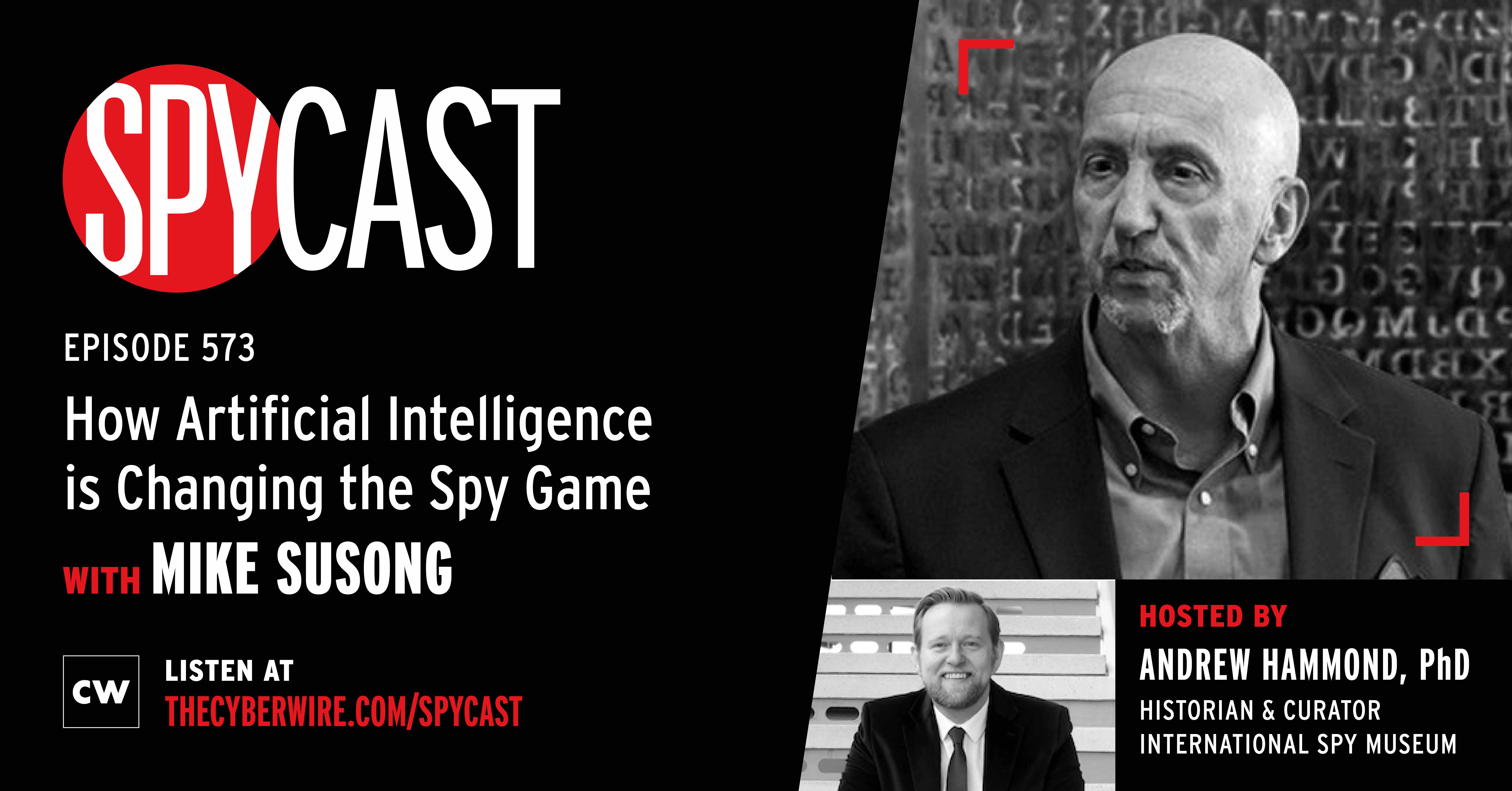
"How Artificial Intelligence is Changing the Spy Game" – with Mike Susong
Summary
Mike Susong (Website, LinkedIn) joins Andrew (Twitter; LinkedIn) to discuss the impact and potential of AI on the intelligence field. Mike is a former CIA case officer who now oversees global intelligence for a risk management company.
What You’ll Learn
Intelligence
- What AI is and why it matters
- How the Intelligence Community is using AI
- The pros and cons of AI for case officers in the field
- Ukraine - intersections between AI and OSINT
- AI in Alan Turing’s Imitation Game
Reflections
- Replicants, machines and robots
- Will humans become obsolete?
And much, much more …
Episode Notes
When the AI Robot “Watson” beat Ken Jennings in a three-day ‘Jeopardy!’ competition, Jennings famously responded, “I, for one, welcome our new computer overlords.” This week on SpyCast, we explore how, intelligence is embracing AI – or “these computer overlords.” What is it, how is AI being used, and how could the Intelligence Community better employ it to enhance national security?
Mike Susong, an expert in the growing field of artificial intelligence, joins Andrew to discuss these questions and more. Informed by his years of experience within the Intelligence Community as a case officer and now in the private sector, Mike illuminates where AI came from, and where it can go in the future. Utilizing examples from the war in Ukraine, you’ll be amazed at the capabilities of artificial intelligence combined with the other -”INTs (especially OSINT).” This is an episode you won’t want to miss.
And…
Andrew teamed up with ChatGPT (let’s be honest, ChatGPT did most of the work) to write a Shakespearean sonnet - about espionage Read that sonnet here!
Quotes of the Week
“My concern is, and it pains me a bit, is that the intelligence community -- which I love dearly and am proud of everything I did and proud of everyone who continues to serve -- is it will take a lot of bureaucratic bravery and it will take a fundamental change, I think, in the way AI is applied to make it a revolution.” – Mike Susong.
Glossary:
- AGI: Artificial General Intelligence. The unrestricted ability of software to learn, understand, & respond to any intellectual task that a human being is capable of.
- ANI: Artificial Narrow Intelligence. The restricted ability of software to perform a limited subset of intellectual tasks.
- Deep Learning: a machine learning technique that teaches computers to learn by example, something that comes naturally for human beings.
- Machine Learning: The field of study interested in building computational systems that can improve their own performance of some task.
- Natural Language Processing: A field of study that aims to analyze and understand human language communications both spoken and textual.
- Uncanny Divide: Where people feel a sense of unease or revulsion in response to humanoid robots that are highly realistic.
Resources
SURFACE SKIM
Andrew’s Recommendation
- AI for Everyone, Andrew Ng, DeepLearning.AI, (Coursera, n.d.)
*Beginner Resources*
- Machine Leaning: Explain it to me Like I’m 5 Years Old, Bob Deprizio, Medium (2020)
- What is AI (Artificial Intelligence)?, Youtube (2019) [2 min. video]
- Singularity: Explain it to me Like I’m 5 Years Old, Roey Tzezana, Futurism (2017) [Article]
- Alan Turing: The experiment that shaped artificial intelligence, N. Sharkey, BBC (2012) [Article]
*SpyCasts*
- From the CIA to Strategic Cyber -- with Hans Holmer (2022)
- So, I Design Board Games for the CIA... - with Volko Ruhnke (2022)
- CIA Case Officer, Cyber Entrepreneur, Burning Man Volunteer – with Mike Susong (Part 1 of 2, 2022)
- CIA Case Officer, Cyber Entrepreneur, Burning Man Volunteer – with Mike Susong (Part 2 of 2, 2002)
- The Cyber Zeitgeist – with Cyberwire Host Dave Bittner (2021)
DEEPER DIVE
Books
- The Age of AI: And Our Human Future, Kissinger et.al., (LB&C, 2021)
- AI: A Modern Approach, Peter Norvig & Stuart Rissell (Pearson, 2020)
- The Master Algorithm, Pedro Domingos (Basic Books, 2018)
- Alan Turing Decoded, Dermot Turing (History Press, 2022)
- Superintelligence: Paths Dangers, Strategies, Nick Bostrom (OUP, 2014)
Articles
- OSINT: Bellingcat Resource Page [Collection of articles, guides, and case studies] (n.d.)
- Drone advances amid war in Ukraine could bring fighting robots to front lines, PBS (2023)
- Uncanny Valley: What is it and Why Do We Experience It?, A. Hughes, ScienceFocus (2022)
- Re-Imagining Espionage in the Era of Artificial Intelligence, E. L. Andrews, Stanford University (2021)
- The Coming Revolution in Intelligence Affairs, Anthony Vinci, Foreign Affairs (2020)
- AI: What is Was and What it Should Be, Hala Abdel Hameed, IJACSA, Vol. 11, No.6 (2020)
- The Birthplace of AI, Jorgen Visdal, Cantors Paradise (2019)
- A Computer Called Watson, IBM at 100 (2011)
- Deep Blue, IBM at 100 (2011)
Reports
- Maintaining the Intelligence Edge, Brian Katz, CSIS (2021)
- Is the Intelligence Community Staying Ahead of the Digital Curve? Elizabeth Leyne and Yvette Nonte, Belfer Center (2021)
- The AIM Initiative: A strategy for Augmenting Intelligence Using Machines, DNI (2019)
Audio
Video
- AlphaGo – The Movie, Deepmind (2020)
- Two Robots Debate the Future of Humanity, Rise (2017)
Primary Sources
- Offer to Assist Ukraine with Facial Recognition, H. Ton-That, Clearview AI (2022)
- Director Petraeus Remarks at In-Q-Tel Summit (2012)
- All Watched Over by Machines of Loving Grace, Richard Brautigan, The Atlantic (2011 [1967])
- A Proposal for the Dartmouth Summer Research Project on AI, John McCarthy et. al. (1950)
- Computing Machinery and Intelligence, Alan Turing (1950)
- On Computable Numbers, Alan Turing (1936)
*Wildcard Resource*
- During the episode, Mike suggested inputting “Mickey Mouse ascending the Himalayas in the Impressionist style” into the AI art program DALL-E – Here are the results!


